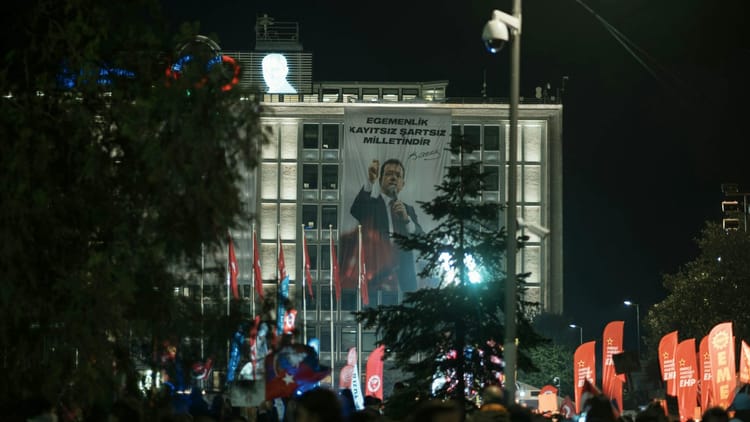What do we have here

Recently: What does Qatar want from America? Nick Cleveland-Stout on Doha’s massive influence operation in Washington.
Today: What do three emails from a notorious convicted sex trafficker actually prove about the U.S. president? U.S. House Democrats selected them from 23,000 pages of documents, and none are to or from Trump himself.
+ For members: Can new U.S. sanctions on oil from Russia end the war in Ukraine? Abraham Newman on the logic and goals of America’s economic-security strategy.
& New music from Oneohtrix Point Never ...
Epstein’s version of events
U.S. House Democrats have released emails from the estate of the late convicted sex offender Jeffrey Epstein that refer directly to President Donald Trump—correspondence between Epstein and his former girlfriend and accomplice Ghislaine Maxwell, and between Epstein and the American author Michael Wolff. In one from 2011, Epstein wrote to Maxwell that an unnamed person (whom Democrats describe as a trafficking victim) “spent hours at my house” with Trump. In another from 2019 to Wolff, Epstein wrote: “Of course he knew about the girls.” In a 2015 exchange with Wolff, Epstein discussed whether Trump would face questions about their relationship during a CNN interview, while Wolff suggested Epstein could “hang him” or “save him, generating a debt.” Trump neither sent nor received any of them. What do these messages actually show?
They all document Epstein’s claims, not what happened. Epstein (who was convicted of sex trafficking and killed himself in prison in 2019) and Maxwell (who’s serving 20 years for sex trafficking) both had reasons to claim connections to powerful people, whether truthfully or strategically. Trump says he banned Epstein from his Mar-a-Lago Club in Palm Beach, Florida, two decades ago for “being a creep.” The White House calls the release “selective” and designed to “smear” the president. Republicans released 20,000 additional pages on Wednesday, including emails where Epstein disparaged Trump. Virginia Giuffre—the person Democrats say Epstein was referencing in the 2011 email—wrote in her posthumously published memoir that Trump “couldn’t have been friendlier” when they met. She never accused him of wrongdoing. The emails capture Epstein’s version of events. They don’t settle what Trump did, what he knew, or the question of when the two men stopped seeing each other.

Meanwhile
- Caribbean intelligence suspended. The United Kingdom has stopped sharing intelligence with the United States about suspected drug-trafficking vessels in the Caribbean on account of the Americans’ ongoing extrajudicial strikes against these vessels. Colombia’s President Gustavo Petro has likewise ordered Colombian security forces to suspend intelligence sharing with American agencies until the strikes stop. Canada intends to continue its Coast Guard partnership but told Washington it doesn’t want its intelligence used to help target boats for deadly strikes. The USS Gerald R. Ford carrier strike group entered Latin American waters on Tuesday.
- American investigators removed mid-probe. Fannie Mae—the U.S. government-backed mortgage giant—removed about a dozen ethics investigators who were examining whether the Trump administration official Bill Pulte improperly obtained mortgage records of New York Attorney General Letitia James and other prominent Democrats. The agency fired the investigators last month as they probed who ordered staff to access the documents. The Federal Housing Finance Agency’s Office of Inspector General sent the findings to federal prosecutors in eastern Virginia. Pulte leads the FHFA, which oversees Fannie Mae.
- Paris drafts a constitution. France announced on Tuesday that it will establish a joint committee with the Palestinian Authority to draft a constitution for a future Palestinian state. The PA is seeking international support for statehood recognition. Israel has pledged not to allow a Palestinian state. France recognized one in September. The new drafting process will involve French legal experts working alongside Palestinian officials.
- Aid to Sudan collapses. The United Nations International Organization for Migration warned on Tuesday that in Sudan’s North Darfur region, humanitarian operations are approaching collapse. Warehouses are nearly empty, aid convoys face significant insecurity, and access restrictions prevent sufficient delivery. Nearly 90,000 people fled El Fasher and surrounding villages since the Rapid Support Forces paramilitary group captured the area. A UN review committee reported famine in two Sudanese regions—Darfur and South Kordofan—as increased fighting has been blocking humanitarian access.
- Fung-wong makes landfall. Taiwan evacuated more than 8,300 people on Tuesday and issued a land warning for Tropical Storm Fung-wong, which made landfall on Wednesday evening near the island’s southern tip with winds reaching 108 kilometers an hour. Authorities prepared emergency shelters and warned residents in vulnerable areas to move to higher ground. The storm follows Typhoon Kalmaegi, which killed at least 188 people in the Philippines and five in Vietnam last week.

Finally, a treadmill you’ll stick with
Meet the Aviron Victory, the only treadmill powered by game psychology and industry-leading hardware to make working out something you actually look forward to—and to keep you coming back.
Use code VICTORY50 for an additional $50 off and start your 30-day trial, risk-free.
From the files
Turning off the oil
Can new U.S. sanctions on oil from Russia end the war in Ukraine? Abraham Newman on the logic and goals of America’s economic-security strategy.
—Michael Bluhm, Abraham Newman

New U.S. sanctions on Russia’s major oil firms appear to be having significant effects. On October 22, the American administration banned all transactions with Rosneft and Lukoil, the largest drilling and refining companies in the Russian Federation, and threatened to blacklist anyone doing business with them.
Even though the sanctions don’t take effect until November 21, China and India—the two top buyers of Russian oil—have already almost completely stopped deliveries. State-owned and independent refineries in China have halted all purchases of Rosneft crude, including pipeline deliveries to northeast China. Oil refiners in India have refused to buy any more Russian oil at all, except for one plant in India—owned by Rosneft.
Bulgaria has moved to nationalize a Lukoil refinery in the Black Sea port of Burgas—a facility that provides most of the country’s fuel. And Lukoil’s subsidiary in Iraq, which produces about as many barrels a day as all of Libya, declared a force majeure on November 10—essentially claiming that circumstances beyond its control made it impossible to continue operations.
These new sanctions hit as the Kremlin’s budget has come to depend heavily on revenues from oil and, to a lesser extent, natural gas. Some estimates suggest that when there’ve been high oil prices during the Ukraine war, about 40 percent of the state’s income derived from sales of fossil fuels. The overall Russian economy is highly unstable, as inflation and interest rates remain persistently high, while GDP growth—which had outpaced many Western countries in 2023 and 2024—now looks like it won’t even top one percent for the year.
Meanwhile, Ukraine keeps hitting Russian oil installations deep inside the country with drones and missiles. Just in November, Kyiv has successfully attacked major refineries in the Volgograd and Saratov regions.
So will these sanctions finally force Russian President Vladimir Putin to end the war—or at least negotiate a ceasefire?
No one outside Putin’s circles knows how he’ll respond, but—as Abraham Newman discusses here in The Signal—Washington has never thought that its sanctions would stop the war. Instead, Abe says, the goal is to increase Russia’s costs of conducting the war—the sanctions deprive the Kremlin of valuable economic resources.
Yes, around the world, sanctions against Russia’s oil industry could lead to higher energy prices—and financial pain for consumers and political pain for elected leaders. Which might make sanctions seem like a bad strategy. But the White House doesn’t typically use them as part of a broad, coherent, master plan. “I don’t see a grand strategy behind it,” Abe says …
Your loyal guide to a changing world.
Membership with The Signal means exclusive access to premium benefits:
- Regular profiles on the questions behind the headlines
- In-depth feature interviews with our network of specialist contributors from across America and around the world
- The despatch, our weekly current-affairs and cultural-intelligence briefing
- Early access to new products, including print extras
It also means vital support for an independent new enterprise in current-affairs journalism.
New music
‘Cherry Blue’
Tranquilizer is the upcoming eleventh studio album by the American electronic musician Daniel Lopatin, under his creative alias Oneohtrix Point Never. And “Cherry Blue” illustrates it well: swirling, contemplative, layered. Apparently, Lopatin discovered the record’s sound palette in a sample library on the Internet Archive. Electronic music, yes—though you’d probably say not for dancing.





